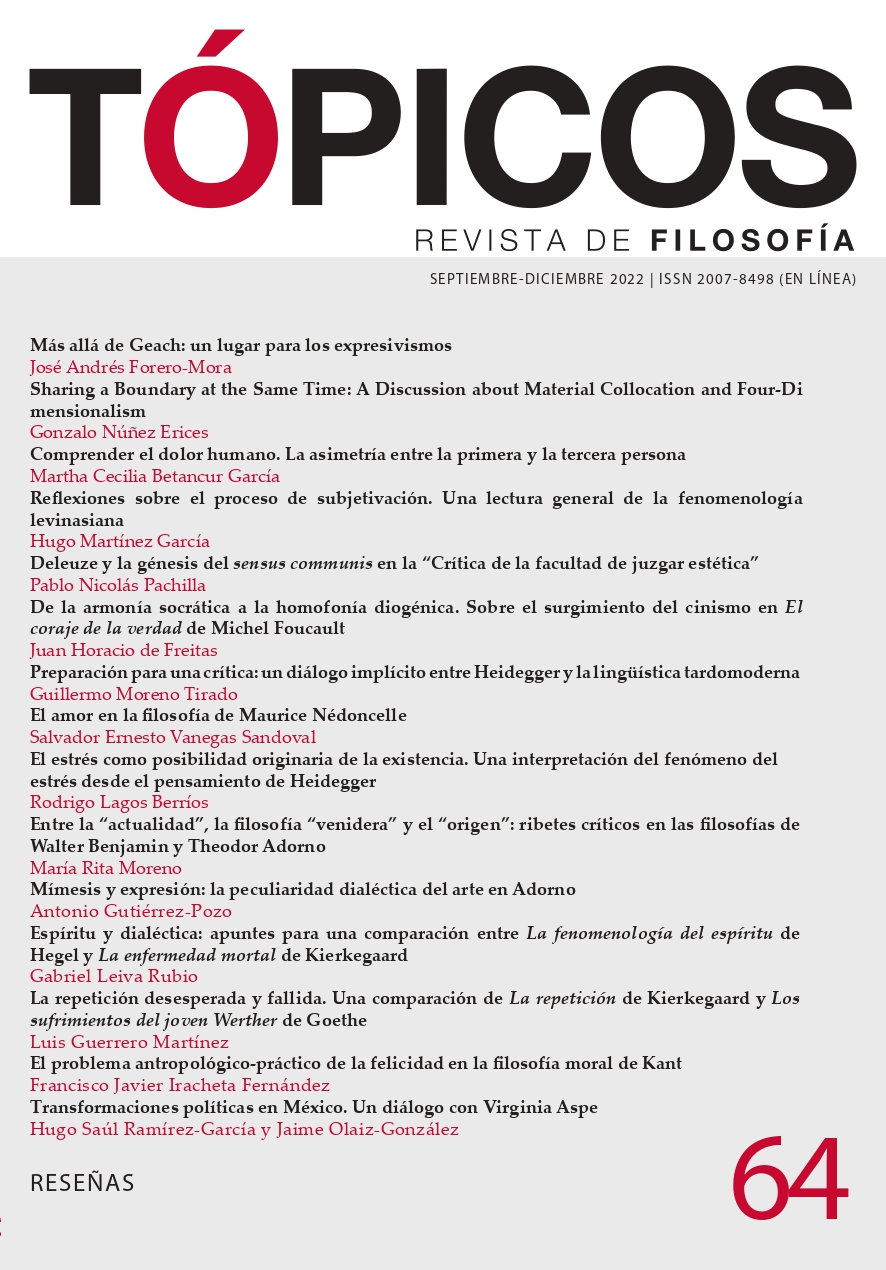Publicado 2022-08-13
Palabras clave
- metafísica moral,
- antropología práctica,
- felicidad,
- libertad,
- razón práctica
Derechos de autor 2022 Tópicos, Revista de Filosofía

Esta obra está bajo una licencia internacional Creative Commons Atribución-NoComercial-SinDerivadas 4.0.
Cómo citar
Resumen
El proyecto filosófico moral de Kant pretende ser una unidad articulada entre metafísica moral y antropología práctica. En sus dos trabajos en los que lleva a cabo la fundamentación de su metafísica moral, a saber, la Fundamentación de la metafísica de las costumbres y la Crítica de la razón práctica, Kant insiste en que no toma nada en préstamo de la antropología para sustentar ese fundamento, mientras que en sus dos trabajos prácticos posteriores más importantes, la Religión dentro de los límites de la mera razón y la Metafísica de las costumbres, Kant se da a la tarea de aplicar su metafísica moral a la antropología. Tomando en consideración que, para Kant, la felicidad empírica es un deseo esencial del ser humano, pero también que su metafísica moral es incoherente sin negar racionalidad y libertad a todo incentivo sensible, este artículo problematiza la posibilidad del proyecto articulado de la filosofía moral kantiana.
Referencias
- Allison, H. (1991). Kant’s Theory of Freedom. Cambridge University Press.
- Aune, B. (1979). Kant’s Theory of Morals. Princeton University Press.
- Beck, L. W. (1960). A Commentary on Kant’s Critique of Practical Reason. The Universiy of Chicago Press.
- Bittner, R. (1974). Maximen. En G. Funke y J. Kopper (eds.), Akten des 4. internationalen Kant-Kongresses: Mainz, 6.–10. April 1974. (pp. 485-498). De Gruyter.
- Bittner, R. (2001). Doing Things for Reasons. Oxford University Press.
- Bittner, R. y Cramer, K. (1975). Materialen zu Kants “Kritik der praktischen Vernunft”. Suhrkamp.
- Chamberlin, H. (2013). Korsgaard and the Wille/Willkür Distinction: Radical Constructivism and the Imputability of Immoral Actions. Kant Studies Online, 72-101. URL: https://kantstudiesonline.net/uploads/files/GianniniHeidi01013.pdf.
- Cicerón, M. T. (2006). Sobre los deberes. J. Guillén Cabañero (trad.). Alianza.
- Darwall, S. (1983). Impartial Reasons. Cornell University Press.
- Edwards, J. (2000). Self-Love, Anthropology, and Universal Benevolence in Kant’s Metaphysics of Morals. The Review of Metaphysics, 23(4), 887-914.
- Fonessu, L. (2008). Mandatos y consejos en la filosofía práctica moderna. Isegoria, 39, 129-152.
- Herman, B. (1993). The Practice of Moral Judgment. Harvard University Press.
- Hills, A. (2006). Kant on Happiness and Reason. History of Philosophy Quarterly, 23(3), 243-261.
- Hudson, H. (1991). Wille, Willkür and the Imputability of Immoral Actions. Kant-Studien, 82(2), 179-196.
- Irwin, T. (1984). Morality and Personality: Green and Kant. En A. W. Wood (ed.), Self and Nature in Kant’s Philosophy. (pp. 31-56). Cornell University Press.
- Irwin, T. (1996). Kant’s Criticisms of Eudaemonism. En S. Engstrom y J. Whiting (eds.), Aristotle, Kant, and the Stoics: Rethinking Happiness and Duty. (pp. 63-101). Cambridge University Press.
- Johnson, A. (2005). Kant’s Empirical Hedonism. Pacific Philosophical Quarterly, 86, 50-63.
- Kant, I. (1993). La metafísica de las costumbres. A. Cortina Orts (trad.). Tecnos.
- Kant, I. (2005a). Crítica de la razón práctica. D. M. Granja Castro (trad.). FCE-UAM-UNAM.
- Kant, I. (2005b). Religion Within the Boundaries of Mere Reason. En The Cambridge Edition of the Works of Immanuel Kant: Religion and Rational Theology. (pp. 39-216). G. di Giovanni (trad.). Cambridge University Press.
- Kant, I. (2006). Kritik der Urteilskraft. Meiner.
- Kant, I. (2011). Critica de la razón pura. M. Caimi (trad.). FCE-UAM-UNAM.
- Kant, I. (2014). Antropología en sentido pragmático. D. M. Granja Castro, G. Leyva y P. Sorandt (trads.). FCE-UAM-UNAM.
- Kant, I. (2016). La religión dentro de los límites de la mera razón. F. Martínez Marzoa (trad.). Alianza.
- Kant, I. (2017). Die Religion innerhalb der Grenzen der bloßen Vernunft. Reclam. URL: http://www.gutenberg.org/files/56182/56182-h/56182-h.htm.
- Kant, I. (2018). Vorlesungen über die Metaphysik. Wentwoth Press.
- Korsgaard, C. (1996). Creating the Kingdom of Ends. Cambridge Univ. Press.
- Korsgaard, C. (2008). The Constitution of Agency. Oxford University Press.
- Kohl, M. (2015). Kant on Determinism and the Categorical Imperative. Ethics, 125(2), 331-356.
- Marey, M. (2017). El rol de la felicidad ajena en la filosofía práctica de Kant. Diánoia, 62(78), 119-145.
- Meerbote, R. (1982). Wille and Willkür in Kant’s Theory of Action. En G. S. Moltke (ed.), Interpreting Kant. (pp. 68-89). University of Iowa Press.
- Murphy, J. B. (2001). Practical Reason and Moral Psychology in Aristotle and Kant. Social Philosophy and Policy, 18, 257-299.
- Noller, J. (2019). “Practical Reason Is Not the Will”: Kant and Reinhold’s Dilemma. European Journal of Philosophy, 27, 852-864.
- O’Neill, O. (1975). Acting on Principle: An Essay on Kantian Ethics. Columbia Univ. Press.
- Prauss, G. (1983). Kant über Freiheit als Autonomie. Suhrkamp.
- Reinhold, K. L. ([1792] 2008). Briefe über die Kantische Philosophie. II. Basel Schwabe.
- Rivera Castro, F. (2014). Virtud, felicidad y religión en la filosofía moral de Kant. UNAM.
- Schneewind, J. (1998). The Invention of Autonomy. Cambridge University Press.
- Sikka, S. (2007). On the Value of Happiness: Herder contra Kant. Canadian Journal of Philosophy, 37(4), 515-546.
- Sidgwick, H. (1888). The Kantian Conception of Free Will. Mind, 13, 405-412.
- Theunissen, N. (2013). Kant’s Commitment to Metaphysics of Morals. European Journal of Philosophy, 24(1), 103-128.





